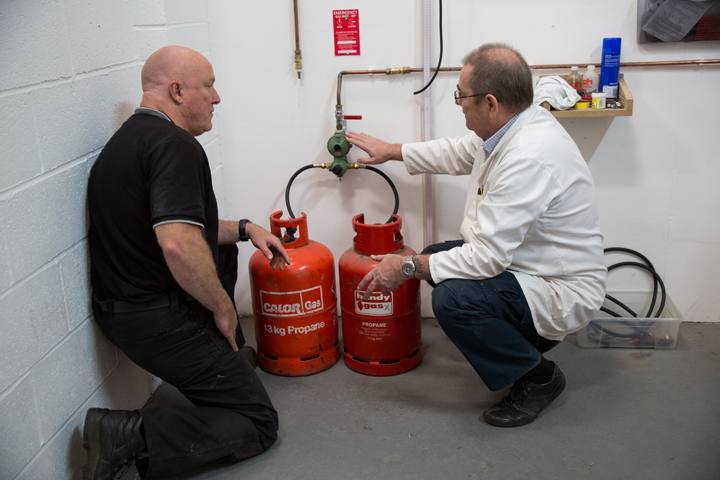
There are plenty of opportunities for Gas Safe engineers in Britain right now, but it can take a long time to get qualified via the 'traditional' training routes like apprenticeships and college courses. It can take at least six months - and often far longer - to become a gas engineer this way.
Fortunately for budding gas engineers and the homeowners who rely on their services, apprenticeships are no longer the only way to become a qualified heating engineer. Over the last few years, intensive gas training courses have soared in popularity throughout the UK, with an increasing number of career changers opting for the fast-track route and attaining Gas Safe status in just a few months.
Some programmes even allow students the flexibility to learn part time so as to accommodate other commitments. This is great news for would-be tradespeople who need to stay in work and/or support a family while completing their gas training.
How long does it take to become a fully qualified gas engineer?
The UK heating industry has been struggling with a serious skills shortage for some time now. Gas Safe engineers are in very high demand; many have found themselves forced to turn down jobs because there's simply no room in their tightly-packed schedules.
So the country needs more gas engineers, and it needs them now. There are many options available to an aspiring gas engineer here in the UK. The push for apprenticeships in previous years, although successful in introducing many young people to the industry, has spread the narrative that full qualification takes years. Often forgotten is the private training industry, a more costly upfront investment but providing rewards much faster in the form of employment and career progression.
Access Training's fast-track gas courses allow you to learn your new trade and get qualified in a matter of months. This is probably the fastest way to become a gas engineer.
Why become a gas engineer?
Here are three good reasons to choose this career path:
- Gas Safe engineers can make a lot of money - according to Totaljobs, the average salary for a gas engineer in the UK is £37,500
- Once you're Gas Safe registered, you can start your own heating company and enjoy the freedom that comes with being your own boss
- As mentioned above, qualified gas engineers are in high demand - so you're very unlikely to find yourself short of work!
Gas Engineer Courses >
How to become a gas safe engineer
Here's a quick step-by-step overview of how to become a Gas Safe engineer:
- Your gas training journey begins in the classroom, where you will learn how gas appliances work and familiarise yourself with important gas safety legislation.
- Next, you will move on to the practical portion of your gas training course, mastering the skills that you'll use every day once you're a qualified gas engineer.
- Your Gas Safe course will culminate in an initial ACS assessment. At the very least, you will need to pass a CCN1 (Core Gas Safety) assessment, but you can choose to add further qualifications - such as CKR1 for gas cookers or CENWAT1 for central heating boilers - if you would like to work on a wider range of gas appliances.
- Once you have passed your initial ACS assessment, you will be eligible to join the Gas Safe Register (previously CORGI). At that point, you can officially call yourself a Gas Safe engineer - congratulations!
- In order to remain on the Gas Safe Register, you must renew your qualifications periodically. This involves attending an ACS reassessment.
Note that we now offer blended training courses that combine online learning with in-centre training sessions. This means that you can commence your Gas Safe training online from the comfort of your own home!
In our virtual classroom sessions, you will learn the fundamental theory that every gas engineer needs to master - not only will you be able to ask questions and interact with your tutor as normal, you will also be able to rewatch each class for revision purposes. Contact Access Training to find out more.
Become a gas engineer with our intensive training courses
If you wish to become a Gas Safe engineer as soon as possible, we recommend the Professional Gas Engineer Course from Access Training. This is a flexible gas training course that's open to everyone - no prior heating or plumbing experience is required to enrol.
This intensive gas course is specifically designed to earn you the qualifications needed to become a professional gas engineer, getting you ready for work within the shortest possible timeframe. All the basics (including gas safety legislation and standards) are covered in online classes; after that, you will attend our fully-equipped training centre for the practical portion of your course. Our expert tutors will make sure you can do everything that's expected of a gas engineer - such as pipework, tightness tests, and repairing a variety of gas appliances.
Our Professional Gas Engineer Course culminates in the ACS gas assessment, which tests students on everything they've learned. If you pass this assessment, you will receive the ACS Certificate - this enables you to join the Gas Safe Register, a legal requirement for gas engineers in the UK.
We also offer a Premier Gas Engineer Course, which includes everything mentioned above plus the Level 2 Diploma in Plumbing. Completion of this course allows you to conduct plumbing as well as gas work, which is a useful advantage for a professional gas engineer to have.
Browse Our Gas Safe Courses >
For more information on how to become a gas engineer, our fast-track gas courses, the qualifications we offer, or how long it will take to complete your training and become a Gas Safe engineer, please do not hesitate to get in touch with the Access Training team.
Last updated 5th July 2022